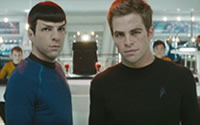 |
Normally, I’m
not into sci-fi and/or action movies that don’t contain any
social commentary that fuses all the hopping, skipping, and
shooting together, but J.J. Abrams’ Star Trek is so well
conceived and assembled that I couldn’t help but simply marvel
at its technical adroitness. There isn’t a shot out of
place—including that lens flare that seems to have bothered some
of you—and such preciseness is a near-extinct art in Hollywood
today. In Star Trek’s case, function follows form: the
viewer becomes engaged in the characters and their histories
because they’re presented in a manner that’s engaging. In
this sense, it’s tempting to see the film as a full-fledged
auteur piece for Abrams. But doing so nearly defeats Star
Trek’s purpose: yes, Abrams anchored everything—against the
odds, too, given the series’ sordid recent past—but a behemoth
movie like this would never exist if it weren’t for thousands of
tech workers. And let’s also not forget that the cast, made up
of a diverse and talented range of performers, may not be the
initial draw of the film, but once the style sucks you in, they
sure do a good job of holding you there.
Screenwriters
Alex Kurtzman and Roberto Orci, best known for their work on
Transformers, made the important realization that the
Star Trek series as we knew it wasn’t headed anywhere good,
trashing many of the cheesy, extraneous elements of the former
films. But that’s not to say that this new take on the
franchise, not so much a reboot as it is a reentry (I’ll spoil
it if I say more), will alienate lifelong Trekkies. Abrams’
Star Trek does not pretend like the other films never
happened (again, I’m providing no details to avoid spoilers)
and, as such, stands faithful to those beloved films that
starred Leonard Nimoy and William Shatner. This seamless
integration of old and new is just another component of the
skillfulness of the filmmakers, which is not only technical but
narrative in nature. Never is this truer than in a second-act
appearance that will surprise and elate at least the half-dozen
series fans that didn’t read up on the plot beforehand.
Star Trek
takes the franchise’s saga way back to before James T. Kirk and
Spock were names in the Star Fleet world. The film opens showing
Kirk’s father (Chris Hemsworth), Captain of the U.S.S. Kelvin,
die in combat with an aggressing Romulan ship, commanded by Nero
(Eric Bana). Nero has come from the future to kill his
not-yet-in-power Vulcan nemesis Spock and the entire Vulcan
race, but he will have to wait 25 years for his chance. In fact,
Spock’s future-partner, Kirk, has just been born in an emergency
vessel escaping the explosions. The film then takes the audience
through the childhoods of Kirk and Spock, until they fatefully
meet at the Starfleet Academy and go on to man the U.S.S.
Enterprise. Old characters occupied by new faces—Bones (Karl
Urban), Uhura (Zoe Saldana), Montgomery Scott (Simon Pegg), Sulu
(John Cho), Chekov (Anton Yelchin), et cetera—each make their
respective entrances and join the crew. Soon enough, Nero is
back for a showdown with his future enemies.
There isn’t
anything more substantive about this Star Trek than the
rest in terms of story—traditional in-jokes for fans are about
as deep as it gets—but I would argue that a movie can be complex
in the way that it tells a story. This is what
distinguishes Star Trek from, say, Wolverine –
both films contain the same amount of hollow action, but in
Trek the viewer is actually invested in this action. The
picture moves with stylistic importance and inventiveness,
thereby providing the story the necessary sense of gravitas.
(After all, this is essentially a soap-opera in space.) And
everybody runs with it. The exhilarating actors, particularly
Zachary Quinto as Spock and Anton Yelchin as Chekov, see these
roles as a chance to reinvent characters by fleshing them out,
not completely changing them. The special effects wizards will
likely win an Academy Award for depicting semi-fictional space
as we’ve never seen it before. Composer Michael Giacchino hits
soaring crescendos that keep the audience enveloped. Star
Trek is old Hollywood storytelling at its finest, coupled
with the visual wonder of modern filmmaking – the best work of
mainstream science-fiction I’ve seen in a long time.
-Danny Baldwin,
Bucket Reviews
Review Published
on: 5.28.2009
Screened on:
5.7.2009 at the ArcLight Cinerama Dome in Hollywood, CA and
5.19.2009 at the Edwards San Marcos 18 in San Marcos, CA.
Star Trek is rated PG-13 and runs 127
minutes.
Back to Home

